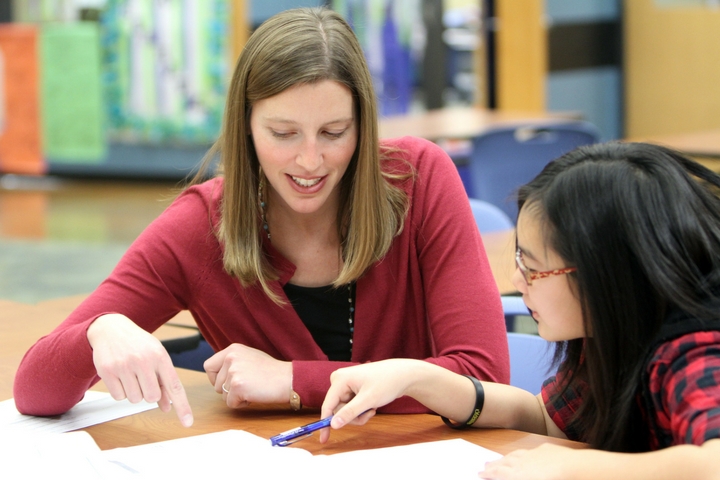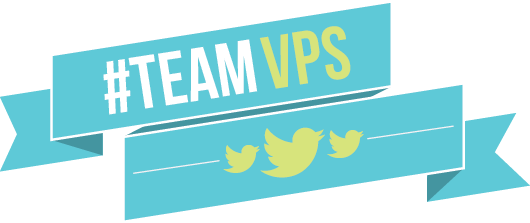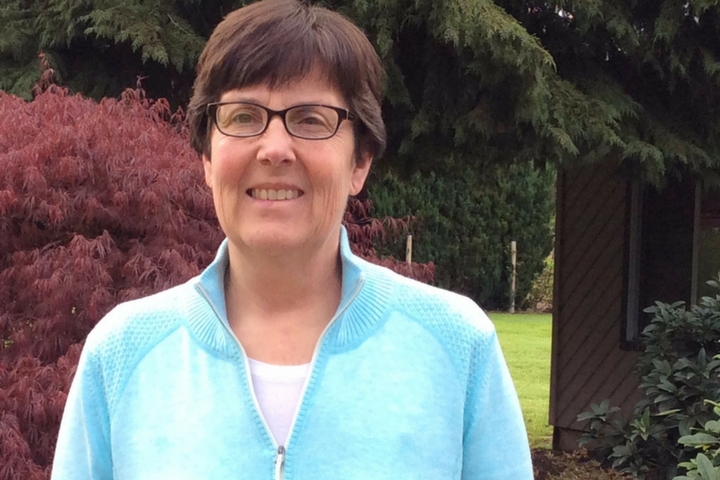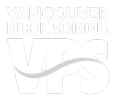
Katie Brown, left, working with a then-student at Shuksan Middle School. Photo courtesy of the Washington Education Association.
Fort Vancouver High School alum Katie Brown is a powerful advocate for all students, their families and educators. That includes students who speak English as a second language, sometimes referred to as English language learners, or ELLs.
In Bellingham Public Schools, Brown’s roles include a teacher on special assignment, ELL specialist at Kulshan Middle School and administrative intern. But the 2014 Washington Teacher of the Year has a voice at the state and national levels, too.
In February 2017, Brown addressed the need to support ELL students in a post for the Washington Teacher Advisory Council’s blog, The Core. “Our students need educators, legislators, policymakers and communities to truly see them,” she wrote. “To see them as individuals with unique strengths, experiences, interests, aspirations and needs.
“ELL students are too often stereotyped as Hispanic, low income and uneducated. A common misconception is that ELLs constitute a homogeneous group that can be addressed under one policy umbrella. In reality, ELLs represent a heterogeneous group with varied linguistic, cultural, ethnic, racial, educational, personal and socioeconomic backgrounds.”
After graduating from Fort in 1996, Brown earned a bachelor’s degree and teaching certificate from Western Washington University and a master’s degree from Seattle Pacific University. She recently completed her principal certificate.
Brown took time to answer a few questions about her path to working in education, ELL students and what’s next for her.
Inside VPS: Growing up, did you always want to be a teacher? If not, what did you want to do? What made you begin to consider teaching as a profession?
Katie Brown: No, I wanted to be a primatologist… I wanted to move to Africa, become Jane Goodall and open a chimpanzee rehabilitation center. I always had an interest in animals and thought I would go into zoology, but science classes overall didn’t seem to interest me much in high school. I went to the University of Redlands in California my freshman year and found anthropology. Two years later, I took a biological anthropology class at Western Washington University and spent a summer in Costa Rica studying howler monkeys (the loudest animal on the planet, I might add). This is when I realized I did not want to be a primatologist. What I looked forward to every day instead was running down the road to the local village to play soccer with the children. I wanted to connect with people from other backgrounds and study culture and language. I graduated from WWU with a degree in cultural anthropology, became an AmeriCorps VISTA member and moved to Juneau, Alaska, to work with the Tlingit and Haida Native American tribes focusing on adolescent health. I started a traditional canoeing program with native youth and ended up working alongside them in the public schools. This was when I started to realize I loved teaching in the classroom. I returned to WWU to earn my teaching degree in social studies and teaching English to speakers of other languages.
Do you remember any particular teachers at Fort who inspired you?
The teachers who inspired me were also my athletic coaches, such as Julie Pagel and Karen Hill. I will always appreciate Julie Pagel for her humor and genuine love for her students. My coaches saw the leadership potential in me and helped me grow as a person.
Working with students for whom English is a second language clearly is a passion for you. Is it something you set out to do when you began thinking about teaching?
I didn’t set out to work with English language learners specifically, but I always had a desire to teach all of my students about diversity, culture and tolerance. As our ELL population grew in the Bellingham School District, I jumped at the first opportunity to take that role. Also, ELL specialists in Bellingham have three areas of our work: student support, teacher support and family engagement. One of the reasons I love my job now is that I get to work alongside other teachers and help make their content accessible for ELL students, and I get to focus on building relationships with families.
How do you define success in an ELL classroom?
Success in an ELL classroom is the same as any other classroom. Students are successful when they feel safe, respected, cared for, challenged and can experience growth. In other words, ELL students are successful when their teachers know who they are as individuals; provide meaningful and relevant learning experiences for them; and utilize their incredible wealth of experiences, language and culture as a springboard to learning. ELL students are successful when their heritage language is seen as a valuable asset to learning, not an obstacle.
You’ve tweeted about visiting the home of students who were new to the district. What is that experience like?
Home visits are essential to build the trust and relationships with families needed for authentic partnerships. Students can’t learn when their basic needs are not met. When we welcome families into our district by going to their home, we are walking in with open arms, resources and no ulterior motives. In Bellingham, we have amazing community support from local business and organizations, so home visits allow us to find out what the basic needs of the family are, such as furniture, food, health care, etc. Once trust is established with families, they are so much more open to coming to the school and telling us how we can best support them.
You’re working on your principal certification and doctorate of education. What’s next for you?
My next steps are to move into building leadership either as an assistant principal or principal and work toward creating positive school environments for students, teachers and families. My vision as a leader in education is to: 1) love and honor all students; 2) create a positive school culture rooted in relationships and care for others; 3) provide high-quality professional learning for teachers; and 4) collaborate with staff, parents and the community to close achievement and opportunity gaps for our students.
What do you enjoy doing when you’re not at work?
What I enjoy most is being outside at home on my 10 acres east of Bellingham with my husband and three dogs. I love walking, hiking, reading, cooking and enjoying our view of the North Cascades. Really, I enjoy anything that involves exercise and the outdoors.
This and other stories originally appeared in the May 2017 issue of Inside Vancouver Public Schools.


#TeamVPS: Julie Pagel
American Sign Language teacher/bowling coach
Fort Vancouver High School
Years with VPS: 33
A few things I’ve learned:
To have high expectations for myself, my students and athletes, and to tune out naysayers and find ways to be successful no matter the circumstance.
Three words that describe me:
Enthusiastic, committed, competitive.
When I’m not working:
I enjoy spending time with my family and friends, traveling, watching movies and plays, bowling and golfing.
